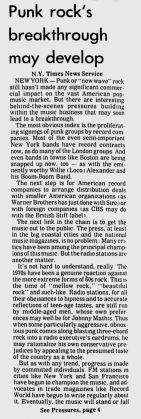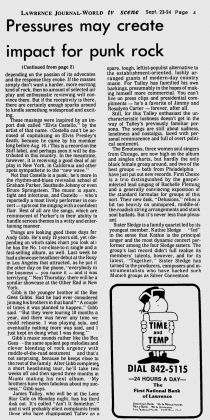Lawrence Journal-World, September 24, 1977: Difference between revisions
(start page) |
|||
| (5 intermediate revisions by the same user not shown) | |||
| Line 2: | Line 2: | ||
{{:Bibliography index}} | {{:Bibliography index}} | ||
{{:Lawrence Journal-World index}} | {{:Lawrence Journal-World index}} | ||
{{: | {{:Kansas publications index}} | ||
{{:US publications by state index}} | |||
{{Bibliography article header}} | {{Bibliography article header}} | ||
<center><h3> Punk rock's breakthrough may develop </h3></center> | <center><h3> Punk rock's breakthrough may develop </h3></center> | ||
---- | ---- | ||
<center> | <center> John Rockwell / New York Times </center> | ||
---- | ---- | ||
{{Bibliography text}} | {{Bibliography text}} | ||
Punk or "new wave" rock still hasn't made any significant commercial impact on the vast American pop‐music market. But there are interesting behind‐the‐scenes pressures building within the music business that may soon lead to a breakthrough. | |||
The most obvious index is the proliferating signings of punk groups by record companies. Most of the even semi‐important New York bands have record contracts now, as do many of the London groups. And even bands in towns like Boston are being snapped up now, too — as with the eminently worthy Willie (Loco) Alexander and his Boom‐Boom Band. | |||
The next step is for American record companies to arrange distribution deals with smaller American organizations (as Warner Brothers has just done with Sire) or with foreign companies (as CBS may do with the British Stiff label). | |||
The next link in the chain is to get the music out to the public. The press, at least in the big coastal cities and the national music magazines, is no problem: Many critics have been among the principal champions of this music. But the radio stations are another matter. | |||
It's not hard to understand, really. The 1970's have seen a genuine reaction against the more extreme forms of 60's rock. This is the time of "mellow rock," "beautiful rock" and suchlike. Radio stations, for all their obeisances to hipness and to accurate reflections of teen‐age tastes, are still run by middle‐aged men, whose own preferences may well be for Johnny Mathis. Thus when some particularly aggressive, obnoxious punk comes along blasting three‐chord rock into a radio executives eardrums, he may rationalize his own conservative prejudices by appealing to the presumed taste of the country as a whole. | |||
But as with any trend, progress is made by committed individuals. FM stations in cities like New York and San Francisco have begun to champion the music, and advocates in trade magazines like ''Record World'' have begun to write regularly about it. Eventually, the music will stand or fall depending on the passion of its advocates and the response they evoke. If the masses simply don't want a harder, more exciting kind of rock, then no amount of selected airplay and enthusiastic reviewing will convince them. But if the receptivity is there, there are certainly enough sparks around to kindle something widespread and exciting. | |||
These musings were inspired by an import disk called "Elvis Costello," by the artist of that name. (Mr. Costello can't be accused of capitalizing on Elvis Presley's death, because he came by his moniker long before Aug. 16.) This is a record on the Stiff label, and perhaps soon it will be distributed in this country. In the meantime, however, it is receiving a good deal of airplay in New York, in California and other spots sympathetic to the "new wave." | |||
Not that Mr. Costello is a punk; he's more in the rhythm‐and‐blues revivalist school of Graham Parker, Southside Johnny or even Bruce Springsteen. The music is spare, tight and infectious, and Mr. Costello — who's reportedly a most lively performer in concert — spits out the singing with a confident flair. Best of all are the songs, which are reminiscent of Mr. Parker's in their ability to handle serious themes in a witty and entertaining manner. | |||
<!-- | |||
Things are looking good these days for Andy Gibb. He's only 19 years old, yet (depending on which sales chart you look at) he has the No. 1‐or‐close‐to‐it single and a fast‐selling album, as well. Last week he had a showcase headliner debut at the Roxy in Los Angeles that attracted, as he put it the other day on the phone, "everybody in the business‐you name it‐and it was terrifying." Next Thursday, there will be a similar showcase at the Other End in New York | |||
Mr. Gibb is the younger brother of the Bee Gees Gibbs. Had he had ever considered joining his brothers in that band? "A couple of times it was planned to happen," Mr. Gibb said. "But they were touring 10 months a year, and there was never any time we could rehearse. I was playing solo, and eventually nothing more was said, and I just kept on doing what I was doing." | |||
Mr. Gibb's music sounds rather like the Bee Gees‐the same opulent pop melodies and clever blending of rock urgency with middle‐of‐the‐road sentiment‐and that's not surprising, because he keeps close to the rest of the family. At the moment, nearly the en tire tribe, plus attendant in‐laws, children and entourage, lives in Miami; most of the Bee Gees have houses, and Andy and his father have their own houseboats. After Mr. Gibb completes a short headlining tour, he'll take two weeks off and then spend three months in Miami making his next album. "My brothers have been fabulous about my success," Mr. Gibb says. "Especially Barry, who's been so much involved: I think this means as much to him as any of his own records have.'.’ | |||
James Talley, who will be at the Lone Star Cafe on Monday night, has his third disk out. It's called "Ain't It Somethin'," and it will probably elicit complaints from those who have championed Mr. Talley as a spare, tough, leftist‐populist alternative to the establishment‐oriented, lushly arranged giants of modern‐day country music. For Mr. Talley has fancified his own backings, presumably in the hopes of making himself more commercial. You can't live on press clips and Presidential compliments — he's a favorite of Jimmy and Rosalynn Carter — forever, after all. | |||
Still, for this Talley enthusiast the uncharacteristic lushness doesn't get in the way of Mr. Talley's previously familiar persona. The songs are still about sadness, loneliness and nostalgia, laced with personal reminiscence and full of overt political sentiment. He's a moving, interesting performer, and perhaps a broader public will realize that soon. | |||
Smucker's, the large, attractive nightclub near the Brooklyn Academy of Music that was such a healthy addition to New York's night life, has closed for "refinancing." The telephone is "temporarily disconnected." and no word is available when the facility might reopen. Sam Dulberg, the owner, had always said that the backing was shaky, and a recent water‐main break, which also damaged the Academy of Music, was apparently the final blow. --> | |||
{{cx}} | |||
{{tags}}[[Stiff Records]] {{-}} [[My Aim Is True]] {{-}} [[Record World, April 23, 1977|Record World]] {{-}} [[Elvis Presley]] {{-}} [[Graham Parker]] {{-}} [[Southside Johnny]] {{-}} [[Bruce Springsteen]] {{-}} [[Willie Alexander And The Boom Boom Band]] {{-}} [[Record World, September 10, 1977|Record World]] | |||
{{cx}} | {{cx}} | ||
| Line 17: | Line 45: | ||
{{Bibliography notes}} | {{Bibliography notes}} | ||
{{Bibliography next | |||
|prev = :Category:Lawrence Journal-World | |||
|next = Lawrence Journal-World, November 26, 1977 | |||
}} | |||
'''Lawrence Journal-World, September 24, 1977 | '''Lawrence Journal-World, September 24, 1977 | ||
---- | ---- | ||
'' | [[John Rockwell]]'s profile of punk and new wave includes a brief review of ''[[My Aim Is True]]''. | ||
<span style="font-size:92%">(From the [[New York Times, September 16, 1977|''New York Times'', Sep. 16, 1977]].) </span> | |||
{{Bibliography images}} | {{Bibliography images}} | ||
[[image:1977-09-24 Lawrence Journal-World clipping 01.jpg| | [[image:1977-09-24 Lawrence Journal-World clipping 01.jpg|x420px]] | ||
[[image:1977-09-24 Lawrence Journal-World clipping 02.jpg| | [[image:1977-09-24 Lawrence Journal-World clipping 02.jpg|x420px]] | ||
<br><small> | <br><small>Clippings.</small> | ||
{{Bibliography notes footer}} | {{Bibliography notes footer}} | ||
| Line 39: | Line 73: | ||
[[Category:Bibliography 1977]] | [[Category:Bibliography 1977]] | ||
[[Category:Lawrence Journal-World| Lawrence Journal-World 1977-09-24]] | [[Category:Lawrence Journal-World| Lawrence Journal-World 1977-09-24]] | ||
[[Category:Newspaper articles | [[Category:Newspaper articles]] | ||
[[Category:Album reviews]] | |||
[[Category:My Aim Is True reviews]] | |||
Latest revision as of 21:18, 28 August 2023
|

